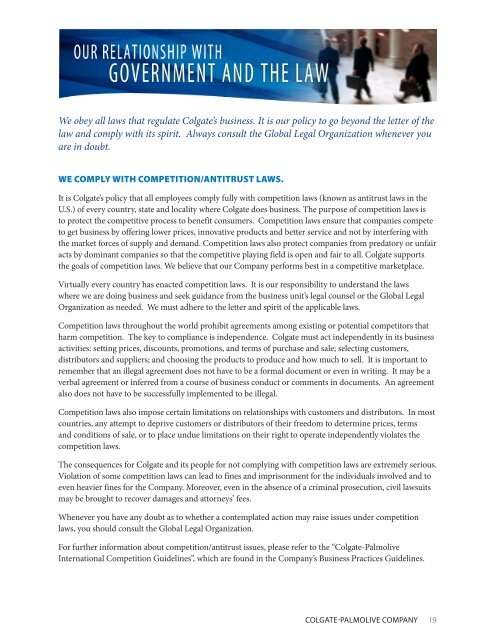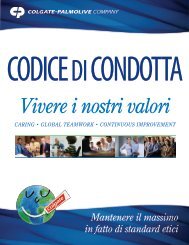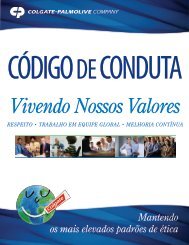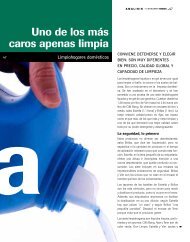English - Colgate
English - Colgate
English - Colgate
- No tags were found...
Create successful ePaper yourself
Turn your PDF publications into a flip-book with our unique Google optimized e-Paper software.
We obey all laws that regulate <strong>Colgate</strong>’s business. It is our policy to go beyond the letter of thelaw and comply with its spirit. Always consult the Global Legal Organization whenever youare in doubt.WE COMPLY WITH COMPETITION/ANTITRUST LAWS.It is <strong>Colgate</strong>’s policy that all employees comply fully with competition laws (known as antitrust laws in theU.S.) of every country, state and locality where <strong>Colgate</strong> does business. The purpose of competition laws isto protect the competitive process to benefit consumers. Competition laws ensure that companies competeto get business by offering lower prices, innovative products and better service and not by interfering withthe market forces of supply and demand. Competition laws also protect companies from predatory or unfairacts by dominant companies so that the competitive playing field is open and fair to all. <strong>Colgate</strong> supportsthe goals of competition laws. We believe that our Company performs best in a competitive marketplace.Virtually every country has enacted competition laws. It is our responsibility to understand the lawswhere we are doing business and seek guidance from the business unit’s legal counsel or the Global LegalOrganization as needed. We must adhere to the letter and spirit of the applicable laws.Competition laws throughout the world prohibit agreements among existing or potential competitors thatharm competition. The key to compliance is independence. <strong>Colgate</strong> must act independently in its businessactivities: setting prices, discounts, promotions, and terms of purchase and sale; selecting customers,distributors and suppliers; and choosing the products to produce and how much to sell. It is important toremember that an illegal agreement does not have to be a formal document or even in writing. It may be averbal agreement or inferred from a course of business conduct or comments in documents. An agreementalso does not have to be successfully implemented to be illegal.Competition laws also impose certain limitations on relationships with customers and distributors. In mostcountries, any attempt to deprive customers or distributors of their freedom to determine prices, termsand conditions of sale, or to place undue limitations on their right to operate independently violates thecompetition laws.The consequences for <strong>Colgate</strong> and its people for not complying with competition laws are extremely serious.Violation of some competition laws can lead to fines and imprisonment for the individuals involved and toeven heavier fines for the Company. Moreover, even in the absence of a criminal prosecution, civil lawsuitsmay be brought to recover damages and attorneys’ fees.Whenever you have any doubt as to whether a contemplated action may raise issues under competitionlaws, you should consult the Global Legal Organization.For further information about competition/antitrust issues, please refer to the “<strong>Colgate</strong>-PalmoliveInternational Competition Guidelines”, which are found in the Company’s Business Practices Guidelines.COLGATE-PALMOLIVE COMPANY 19
















